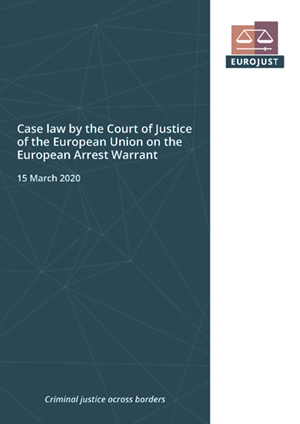The COVID-19 pandemic and the travel restrictions imposed in many Member States had immediate consequences on the way judicial authorities could implement EAWs. The requests to Eurojust focused on questions regarding the possibility to postpone the surrender, transits and precautionary measures to be observed. Judicial authorities also sought guidance on more general issues such as mutual understanding of the legal systems of the Member States involved, facilitation of contacts between judicial authorities, coordination, legal and practical information, and translations and advice on competing EAWs.
In addition to the support to implementation of the EAW in individual cases, the EAW was an important element of the weekly analysis and compilation of the effect of the COVID-19 pandemic on judicial cooperation instruments in the Member States, Iceland and Norway.
Finally, Eurojust updated two key practical guides directly related to developments in the case law of the Court of Justice of the European Union (CJEU) ensuring that they remain fit for purpose for judicial authorities at national level and EU partners:
 1. Overview of case law of the CJEU on the EAW. Since 2007, Eurojust regularly updates its overview of the case law of the CJEU on the application of the EAW. The latest update, published in May 2020, contains summaries of 13 additional judgments. Several chapters were also updated, including the scope of the EAW, the content and validity of the warrant (particularly in view of the landmark judgments on whether a public prosecutor's office can be an 'issuing judicial authority'), the scrutiny of human rights and the chapters on the grounds for refusal (particularly the ground related to residents), guarantees, time limits and requests for additional information.
1. Overview of case law of the CJEU on the EAW. Since 2007, Eurojust regularly updates its overview of the case law of the CJEU on the application of the EAW. The latest update, published in May 2020, contains summaries of 13 additional judgments. Several chapters were also updated, including the scope of the EAW, the content and validity of the warrant (particularly in view of the landmark judgments on whether a public prosecutor's office can be an 'issuing judicial authority'), the scrutiny of human rights and the chapters on the grounds for refusal (particularly the ground related to residents), guarantees, time limits and requests for additional information.
2. Country-by-country overview on questions surrounding the concept of issuing and executing judicial authority in relation to the EAW covering the EU Member States, the United Kingdom and Norway. It includes information on who the competent issuing and executing authorities are in each Member State and on the available effective judicial protection (in particular, the possibility to contest a prosecutor’s decision to issue/execute an EAW). First published in July 2019, this practical tool was drawn up by Eurojust and the EJN to help judicial authorities act correctly in light of the groundbreaking rulings by the CJEU in May 2019. At the time, the Court decided that German public prosecution offices could no longer issue EAWs since they were found not to have sufficient independence from the executive branch of government. A series of further judgments on this topic have followed and are (up until and including December 2020) reflected in the most recent edition, which was published in January 2021.
These tools give judicial authorities quick access to:
- concise information on which judicial authorities ultimately are empowered to take the decisions to issue or execute EAWs;
- information on whether national law affords public prosecutors a guarantee of independence from the executive branch;
- new national legislation following the CJEU rulings;
- certificates in which Member States ensure compliance with the requirements set by the Court.
